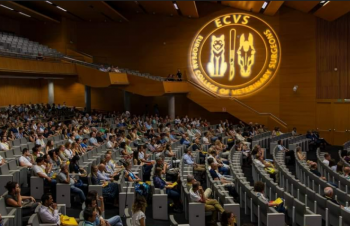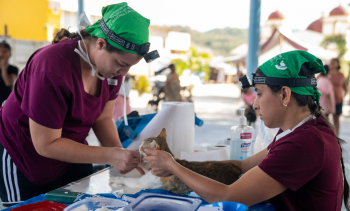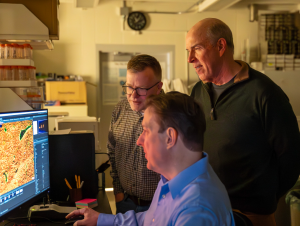At the Michigan State College of Veterinary Medicine, gifts are more than gestures of goodwill—they are the lifeline that fuels innovation, supports student success, and enables critical advancements in animal health. Among these donations, unrestricted gifts are uniquely powerful; unlike gifts earmarked for specific programs or initiatives, these flexible funds empower the College to address urgent needs and seize unexpected opportunities. This support is used strategically to enhance the efforts of our students and faculty by broadening the dissemination of their work, fostering collaboration opportunities, and displaying the MSU’s leadership in the field. As we approach the end of the year, we wanted to highlight some of the ways that unrestricted gifts have been put to work across the College.

Another microgrant was awarded to Dr. Harry Cridge, which will allow him to attend the American Pancreatic Association conference in December. Cridge is working to develop an internationally renowned pancreatic research program at MSU. This conference will give him the opportunity to connect with scientists who are on the cutting-edge of related research. “I will use this opportunity to network and develop crucial research partnerships, allowing me to further my multi-disciplinary clinical research,” says Cridge. “It is a goal of mine to contribute to translation research.”
Unrestricted funds have also been used to help students provide much-needed primary care in Mexico. The Mazunte Project sends teams of DVM and nursing students along with faculty to perform sterilization surgeries on the local dog and cat population in and around Mazunte, Mexico. Among other skills, students learn to deliver anesthesia and recover post-surgical patients. Equally importantly, they provide outreach and education to the pet owners, as well as community members who often come to observe the work.

“The program has grown into an official study abroad program,” says Dr. Donna Harris, assistant professor. “Every student should have the opportunity for an international service if they would like one.” The Mazunte Program illustrates the interconnectedness of ecosystem health and the well-being of domestic animals, wildlife, and humans, while showcasing the vital impact of veterinary care on community balance between land and sea.
Discretionary funds were also provided to the Laboratory for Toxicologic and Environmental Pathology to install an Olympus VS200 research slide scanner. This new technology greatly improves the lab’s microscopic imaging capabilities and streamlines work. As Ryan Lewandowski, the manager of the lab, puts it, “We can support more projects; we deliver higher-quality images, and the technology makes the process of analyzing results much faster and more comfortable.”

Many of the hours once spent bent over a microscope’s eyepiece are now spent at a desk with the image on a large screen. Researchers can adjust the magnification, zoom in and out, and more easily find specific locations on a slide. The computer becomes the microscope— one that is much easier to navigate. The images produced from the scanner have already supported research on topics including COVID-19, diabetes, and lung health.
From supporting faculty and staff through microgrants to advancing initiatives like the Mazunte Project to enhancing research capabilities with new technology, these unrestricted gifts enable us to thrive in a rapidly changing field. We are grateful for our community’s generosity, which makes it possible for the College to continue to Learn, Discover, Heal, and Protect. With this support, MSU is poised to make a lasting impact in the field of veterinary medicine and beyond.
